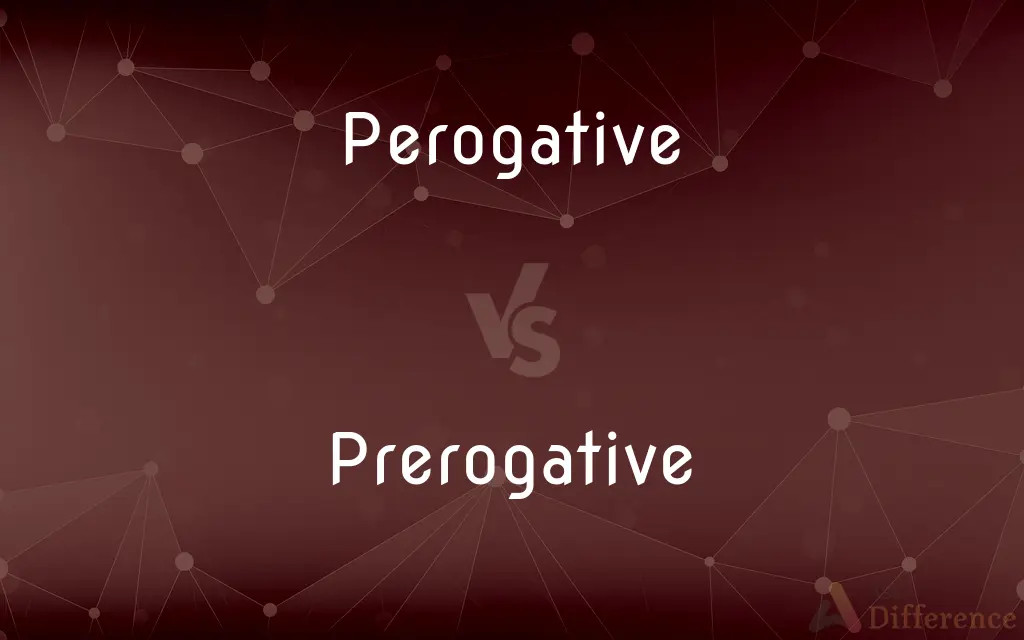Perogative vs. Prerogative — Which is Correct Spelling?
By Tayyaba Rehman — Updated on March 18, 2024
"Perogative" is an incorrect spelling, while "Prerogative" is the correct spelling. Prerogative refers to a special right or privilege exclusive to a particular individual or group.

Table of Contents
Which is correct: Perogative or Prerogative
How to spell Prerogative?

Perogative
Incorrect Spelling

Prerogative
Correct Spelling
ADVERTISEMENT
Key Differences
The word starts with "pre," like "premier" or "preliminary," emphasizing its importance.
Think of the word "rogue" in the middle, but with an extra 'e'—'roge'—to help with the difficult part.
The word ends in "-tive," common in adjectives like "active" or "creative."
Recall the phrase "It's my prerogative," popularized by songs, to reinforce the correct spelling.
Visualize a ruler (representing authority) making a "pre-emptive" decision, linking "pre" and "-tive" to authority.
ADVERTISEMENT
How Do You Spell Prerogative Correctly?
Incorrect: She exercised her perogative and declined the offer.
Correct: She exercised her prerogative and declined the offer.
Incorrect: Choosing the music is the DJ's perogative.
Correct: Choosing the music is the DJ's prerogative.
Incorrect: It's a parent's perogative to set rules in the house.
Correct: It's a parent's prerogative to set rules in the house.
Incorrect: It's your perogative to decide where we go.
Correct: It's your prerogative to decide where we go.
Incorrect: He believes it's his perogative to give orders.
Correct: He believes it's his prerogative to give orders.
Prerogative Definitions
Prerogative is a special right or privilege held by a person or group.
Voting is a prerogative of citizenship.
Prerogative is the exclusive entitlement to make certain decisions.
It's the manager's prerogative to allocate resources.
Prerogative is an advantage or immunity enjoyed by a specific party.
Diplomats often have the prerogative of diplomatic immunity.
Prerogative refers to a freedom or discretion allowed to an individual.
Choosing a career path is your prerogative.
Prerogative denotes an inherent advantage or right possessed by an entity.
Free speech is a prerogative guaranteed by the Constitution.
In law, a prerogative is an exclusive right bestowed by a government or state and invested in an individual or group, the content of which is separate from the body of rights enjoyed under the general law. It was a common facet of feudal law.
A right or privilege exclusive to a particular individual or class
In some countries, higher education is predominantly the prerogative of the rich
Arising from the prerogative of the Crown (usually delegated to the government or the judiciary) and based in common law rather than statutory law
The monarch retained the formal prerogative power to appoint the Prime Minister
An exclusive right or privilege held by a person or group, especially a hereditary or official right.
The exclusive right and power to command, decide, rule, or judge
"Encyclicals became direct exercises of papal prerogative" (Garry Wills).
Of, arising from, or exercising a prerogative.
A hereditary or official right or privilege.
A right, or power that is exclusive to a monarch etc, especially such a power to make a decision or judgement.
A right, especially when due to one's position or role.
A property, attribute or ability which gives one a superiority or advantage over others; an inherent advantage or privilege; a talent.
Having a hereditary or official right or privilege.
Characterized by lawless state actions, as in a prerogative state.
An exclusive or peculiar privilege; prior and indefeasible right; fundamental and essential possession; - used generally of an official and hereditary right which may be asserted without question, and for the exercise of which there is no responsibility or accountability as to the fact and the manner of its exercise.
The two faculties that are the prerogative of man - the powers of abstraction and imagination.
An unconstitutional exercise of his prerogative.
Precedence; preëminence; first rank.
Then give me leave to have prerogative.
A right reserved exclusively by a particular person or group (especially a hereditary or official right);
Suffrage was the prerogative of white adult males
Prerogative Meaning in a Sentence
Having a choice is everyone's prerogative.
It's the teacher's prerogative to assign homework.
As a consumer, it's your prerogative to shop around.
Making the final decision is the leader's prerogative.
The manager used his prerogative to change the schedule.
Declining to participate in the survey is your prerogative.
She viewed choosing her battles as a necessary prerogative.
Expressing opinions freely is a fundamental prerogative.
Choosing team members is the coach's prerogative.
It's her prerogative to change her mind about the plans.
The queen used her prerogative to pardon the prisoner.
The director's prerogative included casting decisions.
Using the office's resources for the project was within his prerogative.
It's a writer's prerogative to end a story how they see fit.
The CEO exercised her prerogative to overhaul the company's strategy.
As a guest, it's your prerogative to leave the party whenever you want.
Editing the manuscript is solely the editor's prerogative.
It's a juror's prerogative to remain impartial.
It's the moderator's prerogative to control the discussion.
Refusing the assignment was his prerogative, despite the consequences.
Choosing not to vote is a citizen's prerogative, though not advisable.
Rejecting the proposal was a tough, but her prerogative.
It's the artist's prerogative to interpret the theme as they wish.
It's the landlord's prerogative to set the terms of the lease.
Taking a leave of absence is an employee's prerogative under company policy.
Prerogative Idioms & Phrases
A royal prerogative
Powers or privileges that are exclusive to the monarch.
Issuing pardons is a royal prerogative.
Exercise one's prerogative
To use one's right or privilege.
He exercised his prerogative to work from home on Fridays.
As is your prerogative
Means you have the right or privilege to make your own choice.
You can decline the invitation, as is your prerogative.
A woman's prerogative
A phrase often used to suggest that changing one's mind is a right traditionally associated with women.
Changing her outfit three times before the party was her prerogative.
A teacher's prerogative
The authority teachers have over classroom decisions.
Assigning homework over the weekend is a teacher's prerogative.
Within someone's prerogative
Within the scope of someone's rights or privileges.
Choosing the restaurant for the team lunch is within your prerogative.
By virtue of prerogative
Because of one's right or privilege.
She chose the team members by virtue of prerogative as team leader.
The prerogative of youth
The right or privilege to enjoy the freedoms and opportunities of youth.
Making mistakes and learning from them is often seen as the prerogative of youth.
A parent's prerogative
The right or privilege inherent to being a parent, especially regarding decisions affecting their children.
Setting a curfew is a parent's prerogative.
An employer's prerogative
The rights or privileges a boss has in managing their employees.
Adjusting roles within the company is an employer's prerogative.
Common Curiosities
What is the verb form of Prerogative?
There is no standard verb form of "Prerogative."
What is the root word of Prerogative?
The root word is Latin "praerogativa."
Which conjunction is used with Prerogative?
"And" can be used, as in "rights and prerogatives."
Why is it called Prerogative?
It's called "Prerogative" from the Latin "prae" meaning "before" and "rogare" meaning "to ask," signifying prior choice or privilege.
Which vowel is used before Prerogative?
Typically, "a" or "the" can precede "Prerogative."
What is the plural form of Prerogative?
The plural form is "Prerogatives."
Is Prerogative an abstract noun?
Yes.
Is Prerogative a negative or positive word?
Neutral, context-dependent.
What is the singular form of Prerogative?
The singular form is "Prerogative."
Is Prerogative a noun or adjective?
It's primarily a noun.
What is the pronunciation of Prerogative?
It's pronounced "pri-ROG-uh-tiv."
Is Prerogative an adverb?
No.
Is Prerogative a vowel or consonant?
It's a word, not a letter.
Is the word Prerogative is imperative?
No.
What part of speech is Prerogative?
Noun.
What is the opposite of Prerogative?
Obligation.
Which preposition is used with Prerogative?
"Of" is commonly used, as in "Prerogative of."
Is the Prerogative term a metaphor?
Not inherently, but can be used metaphorically.
Is the word "Prerogative" a Direct object or an Indirect object?
It can be used as either, depending on the sentence.
Which article is used with Prerogative?
Typically "a" or "the" can be used.
How many syllables are in Prerogative?
4 syllables.
How do we divide Prerogative into syllables?
Pre-rog-a-tive.
Which determiner is used with Prerogative?
"A" or "the" are common.
Is Prerogative a collective noun?
No.
Is the word Prerogative is Gerund?
No.
How is Prerogative used in a sentence?
"It's your prerogative to choose how you spend your time."
Is Prerogative a countable noun?
Yes.
What is a stressed syllable in Prerogative?
The second syllable, "rog."
What is another term for Prerogative?
Privilege.
Share Your Discovery

Previous Comparison
Summery vs. Summary
Next Comparison
Unability vs. InabilityAuthor Spotlight
Written by
Tayyaba RehmanTayyaba Rehman is a distinguished writer, currently serving as a primary contributor to askdifference.com. As a researcher in semantics and etymology, Tayyaba's passion for the complexity of languages and their distinctions has found a perfect home on the platform. Tayyaba delves into the intricacies of language, distinguishing between commonly confused words and phrases, thereby providing clarity for readers worldwide.














































